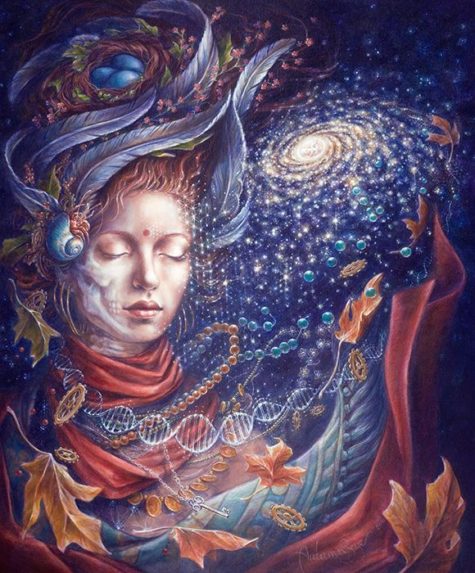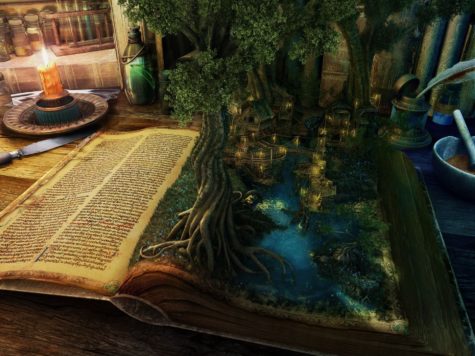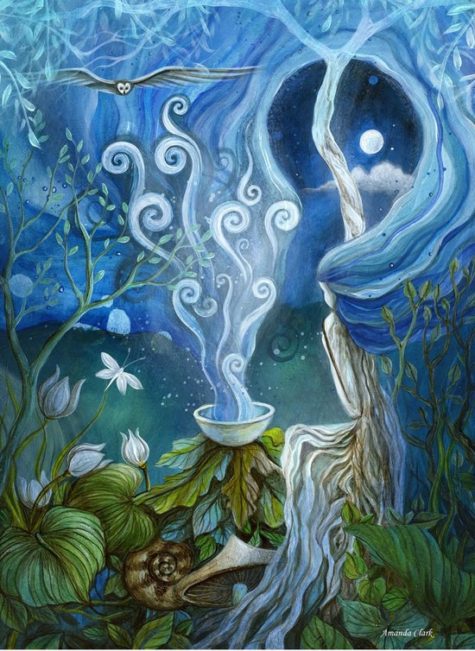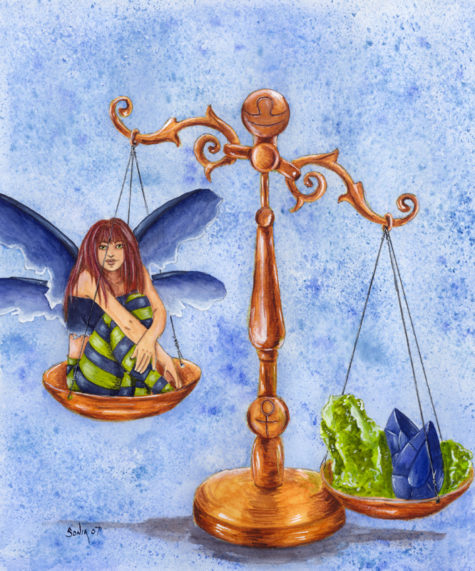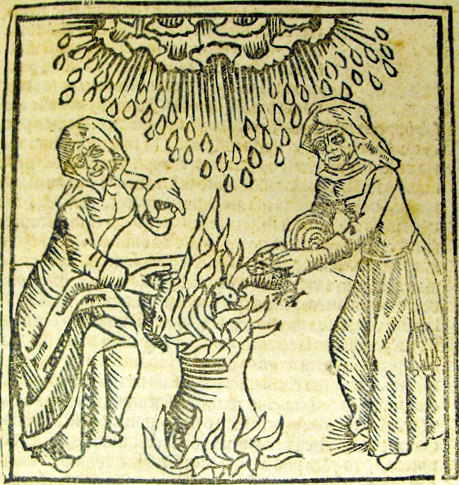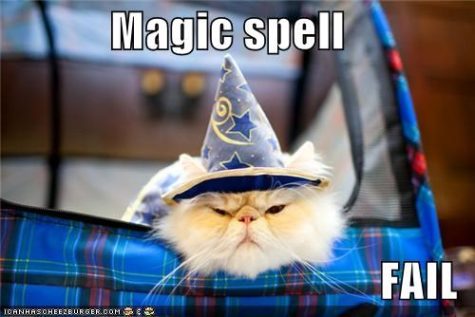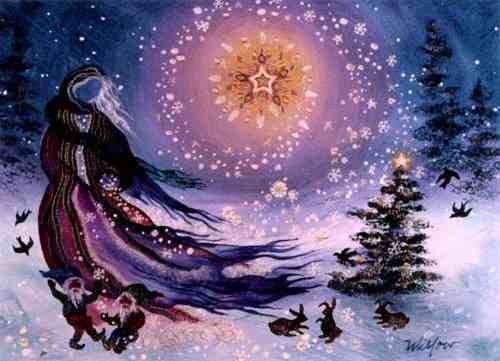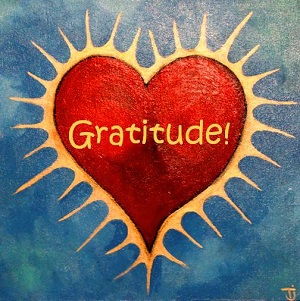Magickal Studies
To some people, the idea that “Magick” is practical comes as a surprise.
It shouldn’t. The entire basis for Magick is to exercise influence over one’s environment. while Magick is also, and properly so, concerned with spiritual growth and psychological transformation, even the spiritual life must rest firmly on material foundations.
The material world and the psychic are intertwined, and it is this very fact that establishes the magickal Link: that the psychic can as easily influence the material as vice versa.
Magick can, and should, be used in one’s daily life for better living! Each of us has been given Mind and Body, and surely we are under Spiritual obligation to make full usage of these wonderful gifts. Mind and Body work together, and Magick is simply the extension of this interaction into dimensions beyond the limits normally conceived. That’s why we commonly talk of the “super-normal” in connection with domain of Magick.
The body is alive, and all Life is an expression of the Divine. There is God-power in the Body and in the Earth, just as there is in Mind and Spirit. With Love and Will, we use Mind to link these aspects of Divinity together to bring about change.
With Magick we increase the flow of Divinity in our lives and in the world around us. We add to the beauty of it all – for to work Magick we must work in harmony with the Laws of Nature and of the Psyche. Magick is the flowering of the Human Potential.
Practical Magick is concerned with the Craft of Living well and in harmony with Nature, and with the Magick of the Earth, in the things of the Earth, in the seasons and cycles and in the things we make with hand and Mind.
The ability to think seems to set us apart from other creatures. And although we are concerned with living in the physical world, we are mental beings. The fact is we are thinking all the time. We plan, we brood, we get depressed or elated — all of it is thought. But the universe is mental too, and if we could control our thinking we would see magnificent results in the everyday world.
Many systems have been developed over the ages to help us control our thoughts. A great amount of dogma too has been kicked around in an attempt to make us into better people. Magick (the occult kind, spelled with a ‘k’) is one of the oldest and most general of these systems. Magick is the study and application of psychic forces. It uses mental training, concentration, and a system of symbols to program the mind. The purpose of magick is to alter the self and the environment according to the will.
Most of the magick we see today comes to us from ancient Egypt and Chaldea. The Chinese, Hindus, and Tibetans developed their own unique types of magick. Western magick was locked up by the Egyptian priests for thousands of years and then suppressed by the rise of Christianity. It was not until medieval Europe that magical knowledge was rediscovered by the alchemists and Cabalists. Only during the past hundred years or so has western culture been open minded enough to permit widespread investigation of the subject. Only since the start of the twentieth century has science shown much interest in it at all.
Author: Phil Hansford
Magick encompasses many things – science and art, philosophy and metaphysics, psychology and comparative religion. Magick is an adventure at the borderlands of the unknown. It can fit the pieces of the puzzle of life into a meaningful whole.
- Magick is fun and interesting.
Use magick to help raise consciousness without drugs. Gain new experiences. Fantasy can come alive through magick. Psychic phenomena can be controlled and be fun and helpful.
- Magick is beneficial.
It can help you to have excellent health, and bring you good luck. With magick, life runs smoothly; life is good. Magick can also be used for personality improvement, to control bad habits and to develop new motivations.
- Magick is powerful.
Never underestimate the tremendous power of magick. Use magick to alter events and to achieve your goals. Exert an influence over people and phenomena. But remember, power for its own sake is self defeating. The power which magick can give you should not be your primary reason for studying it.
Author: Phil Hansford
Consider the herbalist’s scales: things are carefully weighed out to achieve a desired balance. Magic plays with balance too. Sometimes the desire is for all forces to be equal and harmonious. At other times goals are accomplished by deliberately, consciously tipping the scales to provide the required effect.
Left and Right:
Once upon a time, not too long ago, the concept of Dualism associated the direction right with God, high, male, and all those good things. Thus children were forced to use their right hands, the dexterous hand, whether that was their dominant hand or not. Children who were naturally left-handed (the sinister hand) literally had it beaten out of them until they were dexterous too. Consider various phrases: in the right, Mr. Right, the left-hand path, a left-handed compliment.
Connections between genders and these directions, however, predate Dualism and Christianity. They exist in completely unrelated cultures, including some that were isolated for a very long time. Hawaiian magic, for instance, associates left with female, right with male as surely as the Chinese and many Asian, African and European traditions. Frequently offerings to female deities are made with the left hand (by both men and women) while offerings to males are made with the right (by both men and women). Feng shui suggests that it’s beneficial for women to sleep on the left side of a common bed, while a man should sleep on the right. (Although spells intended to reverse the power dynamic within a relationship may suggest those sides be switched.)
Sometimes spells direct that an action be performed with either your left or right hand. Either one of two things is being requested.
1 – Because left is yin and yang is right, the left side of everyone’s body is yin or affiliated with “female forces” while the right side is yang and affiliated with “male forces.” Most frequently a spell’s success depends upon accessing one force or emphasizing one quality over the other.
2 – Sometimes the spell’s success depends upon not using your dominant hand. Because until recently everyone was forced to be right-handed, many older spell books will specify casting a spell with your left hand, because it’s assumed that everyone is right-handed. This is, obviously, no longer the case.
In newer spell books, where the importance lies in not using your dominant hand, this is specified in spell-directions. Left-handed people will be directed to use their right hands. Where no such direction is given, if the only stipulation is to use your left hand, then this applies to everyone across the board.
Article from: Encyclopedia of 5,000 Spells
The medieval demonographer, Martin Delrio, in his Disquisitionum Magicarum Libri Sex, gives this definition:
“An art or skill that, by means of a not supernatural force, produces certain strange and unusual phenomena whose rationale eludes common sense…”
What follows is an interesting (but very dry and scholarly) essay on magic by Harry Wedeck. I did have to pull out my dictionary a couple of times – he does love those big words – but it made me think, gave me a wider perspective, and because of this, I think it deserves a read. So here it is:
Magic is protean. It has multiple names, numberless forms. It is thaumaturgy (the working of miracles) and goety (invocation of spirits). It is witchcraft and it is religion. It is superstition and legend, tested by its potency, its primary effects on the individual, sometimes on the community, and not rarely on large ethnic groups. It enters into private domestic life, and pervades the tribal community. On occasion, it dominates, in its malignant impact, an entire nation, upheaving governments, creating devastation and civic chaos.
It pierces the very basic roots of existence, and sometimes forms itself into a religious cult, capable of overthrowing an established religious system. Impalpable sometimes, at all times secretive and cryptically esoteric, its powers rest in the grip of small dedicated hieratic groups; or in the control of an arch adept; or even, as in ancient Italy, as in the antique Chinese dynasties, in the supreme ruler himself, who is both first citizen and thaumaturgic (miracle working) priest.
Two aspects of witchcraft manifest themselves: White Magic, and the Black Art. Certain demonographers, and magicians as well, have assigned to White Magic an ethical motive: to benefit both the living and the dead. Black Magic, on the other hand, is completely malefic in its operations and its intent. It performs maleficently against its victims, against enemies, and contrary to the normal, commonly accepted view of the orderly sequence of cosmic rhythms in harmony with beneficent mankind.
Fundamentally, magic is the imposition of the human will on the phenomena of nature: and that imposition extends, in the actual practice of Black magic, into a conflict between two forces, one beneficent, and other malefic: constantly at war, over the entire cosmos. That was the primary concept of the ancient cult of the Manichean’s, of the equally mystic cult of Zoroaster.
Witchcraft in its necromantic (communication with the dead), thaumaturgic (working of miracles), and apotropaic (warding off evil) diversity, has invariably been a significant phenomenon of all cultures, at whatever level of development.
It has never been a mere academic diversion. On the country, it has been an integral element, coloring and molding religious, political, and social situations and attitudes. And its impact, in these three directions, has been impressively pronounced in a very realistic sense.
In early ages there was no demarcation between religion and magic. Religion was largely magic, for all religion was directed toward communication with diving agencies and toward a degree of cooperation of these deities for the advantage of man. The pagan rites, the mystic ceremonials of the priestly castes – Egyptian and Assyrian, Hittite and Babylonian – the Eleusinian Mysteries, the Dionysian performances, the cult of Mithra, the festal glorifications involving dedications and sacrifices, paeans (songs) and supplications and invocations – were associated with thaumaturgic arcana (mysteries).
The flow of folk thoughts and tendencies was all directed toward a projection of the self beyond the material, normally observable limitations of the human frame and the human spirit. Ancient witchcraft and wizardry in all their multiple permutations and impacts, like their modern counterparts, constituted virtually an ultimate faith.
Magic was (and still is) a stubborn credo that would not be refused. It was belief without reservation. Whether belief in beneficent principles or in actively malefic potency’s, is another matter. But it was credence that equated man with these agencies, unseen, yet real, that governed the cosmos. It was, in short, man’s attempt toward divinity.
And through the long and perplexed centuries, although magic assumed crudities and accretions of bestiality and demoniac contacts, it was basically the spiritual means, though perverted, made manifest toward this consummation. Magic was the epiphany of man’s ultimate faculty.
Sometimes magick goes awry. Your spell doesn’t work the when or how you expected it to, or maybe it works too well and you have the experience of “be careful what you ask for you just might get it.” Maybe nothing seems to happen, or worse yet, the opposite of what you did the spell work for is your result. Here’s an informative article about what might be happening when your magick doesn’t work like you wanted it to, or thought it should.
Side Effects:
Often as not a ritual may produce side-effects, usually something similar to, though not exactly the desired goal. If the true goal is delayed (as sometimes happens) we may see the side effects first. And if for some reason the goal is not achieved at all (‘missing the target’) the side effects may be pronounced.
For example: You use magick ritual to hurry shipment of an anticipated package in the mail. Side effect – the next day an unexpected package (the wrong one) arrives instead.
Here’s another example: You use magick to cause a certain person to phone you. Side effect – for several days all sorts of people phone you.
When Nothing Happens:
We may say with certainty that “something always happens” when we perform a magick ritual. But like everything else, magick follows the ‘law of results’. This means that results often require effort of some kind. And if you don’t put any effort at all into the desired goal, you may not get any results. And, of course you can help your magical results by working on the physical level toward your goals. Don’t expect them to fall into your lap by themselves.
Difficult goals have greater resistance (magical inertia) to overcome. If the ritual doesn’t produce the desired results there is a good chance that the reason for the failure is within ourselves. It is important to be certain there is no contradiction between your inner model and your magical goals. Sometimes self doubt and mental contradictions (wanting and not wanting at the same time) may interfere. If this is the case, you may want to rethink your goals or do some inner work before recasting the spell.
Time Displacement:
A peculiar quality of magick is time displacement. Results of a ritual are not usually instantaneous. There is often a delay of 12 hours or more. Difficult tasks or weakly performed ritual are more likely to be delayed. In most cases a slight delay is alright, and it gives us time to get used to the coming changes. And sometimes the effects of a ritual appear to extend to before the ritual was performed!
When Magick Backfires:
Because of the way magick works, a ritual may create an emphasis in what is sought, and a de-emphasis in everything else. Balance is therefore important here. Once the magical result is achieved it may be ‘bound’ to you and difficult to get rid of should you later decide to do so.
For Example: You use a magick to help you find and buy a new house. Years later when you decide to sell it, you are unable to do so.
Consider your magical goals wisely so you don’t get stuck with something you don’t really want. Note that theory says you can always unbind through ritual what was bound to you…theory says.
The Opposite Occurs:
Sometimes the environment appears to react against the magick after the results are achieved. This is particularly noticeable in using magick to affect the weather.
For example: Your performance of a ritual to produce a sunny day produces a sunny day. The next day is sunny, alright, but the rest of the month is cold and overcast.
Here the weather seems to react to the magick in the opposite way to re-establish its natural balance. It is something like pushing a pendulum to one side and releasing it — the pendulum swings to the other side.
This effect can also occur if you have a belief system in the “no pain no gain” theory of life, or that to “win some” you have to “lose some.” To quote Emerson – “For everything you gain you lose something…” This does not have to be true in magick, however, it is a scientific truth that for every action there is an equal and opposite reaction. So be cautious when effecting magick for large changes and remember the importance of balance.
That being said, it might also be true that circumstances in your life have to change before the desired magical goal can take effect. A house cleaning of sorts is required, it’s out with the old before the new and greater good can come in.
For example: You do a ritual for harmony in the home and the next day your husband (or wife) asks you for a divorce.
Weird Experiences:
Finally, magick ritual (or any magick or occultism) is very dangerous for the mentally unstable. If you should somehow ‘get out too far’, eat ‘heavy foods’ such as red meat and cheese, ground yourself by connecting with the earth and nature, and use your religious background or old belief system for support. But remember too, that weird experiences are not necessarily bad experiences.
By Phil Hansford
 This nice little ritual helps you to set your magickal intentions for the year. It can be done on your birthday or an anniversary or holiday that is important to you, it can be done on New Years Eve or New Years Day. And of course, a ritual such as this can be done at any time – just remember that it is a commitment, and prepare to follow through.
This nice little ritual helps you to set your magickal intentions for the year. It can be done on your birthday or an anniversary or holiday that is important to you, it can be done on New Years Eve or New Years Day. And of course, a ritual such as this can be done at any time – just remember that it is a commitment, and prepare to follow through.
Here’s how it works:
Get a new white candle, matches, a pieces of paper, a black pen, and some black thread. If you like incense or have any other objects that are special to you, like a crystal, stone bowl, or anything else, you can get them out, but they are not necessary.
Find a quiet spot to work, where others will not disturb you.
On a small piece of paper, write out your intentions for this work. Do you seek to be a witch, learn witchcraft, or just know more? If you are comfortable calling on the Goddess and God, do so. If not, you can address it to whatever divine force you are comfortable using, such as God, Great Spirit, the Tao, or the Universe. Here is an example:
“I,(state your name), ask in the name of the Goddess and God for aid in my studies of witchcraft. I intend to complete this work successfully within one year and become a witch if this is correct and for my highest good. I ask to be open to all experiences and understand all lessons given to me. So mote it be.” (“so mote it be” means “it is so”. It is a common affirmation in witchcraft.)
Hold the white candle. Think about spirituality. Think about divinity and the Goddess and God. Invite them into your life, or reaffirm your bond with them. If you have incense, light it now.
Spend a few moments reflecting on the definition, history, and qualities of the witch. Think about where witchcraft has been, and where you hope to go with it.
Read your intention slip out loud . Then roll it up like a scroll and tie it with the black thread, binding it together and sealing your intention.
Keep the paper someplace special, where you will not lose it. You will use this slip as part of your initiation ritual in a year. In a later chapter, you will build a meditation altar. You can then keep the candle and intention slip on the altar.
- Invocation to the Archangels as a Group by shirleytwofeathers - No Comment
- Invocation to Lord Melchizedek by shirleytwofeathers - No Comment
- Connecting with Fairies by shirleytwofeathers - No Comment
- To Enhance Clairvoyance by shirleytwofeathers - No Comment
- For Release of Addictions and Cravings by shirleytwofeathers - No Comment
- Using the Psalms for Solving Problems by shirleytwofeathers - 148 Comments
- Spiritual Assistance Spell by shirleytwofeathers - 35 Comments
- 62 Spells To Defeat Your Enemies by shirleytwofeathers - 27 Comments
- Once In A Blue Moon Spell by shirleytwofeathers - 24 Comments
- Spell To Find A Lost Pet by shirleytwofeathers - 12 Comments
Mauro: Ritual To Become A Werewolf
Mauro: Becoming A Werewolf Ritual
Janet Silva: Wheel of Fortune Change Your Luck Spell
Linda: Sweet Thoughts Bottle Spell
AnnD: Chant For Guidance
